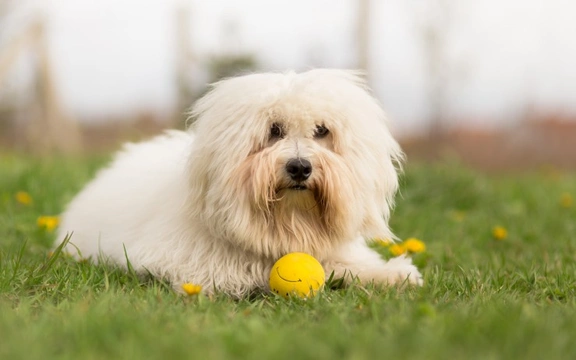
Primary Hyperoxaluria Type 1 (PH1) Health Testing in Dogs
Primary hyperoxaluria type 1 or PH1 is a hereditary health condition that has been identified as a risk to dogs of the Coton de Tulear breed, and which affects the dog’s kidneys and liver due to a deficiency in a certain enzyme that the body requires to break down calcium.
PH1 is a very serious condition that proves fatal in affected dogs in short order, usually at a young age. This means that an affected dog won’t live to adulthood and so, potentially be bred from and pass the condition on themselves – but dogs can also be a carrier of the condition even if they themselves are fine, which means that puppies can still inherit the condition from even seemingly healthy parents.
However, there is a DNA testing protocol in place for dogs of the Coton de Tulear breed, which enables breeders to find out the status of their own dogs prior to making a mating match, and so, avoid breeding from dogs that are likely to have affected litters.
In this article, we will explain the basics of what primary hyperoxaluria type 1 is and how it affects dogs, how the condition is passed on from dog to dog, and how to get your own dog tested to find out their status and risk factors. Read on to learn more.
What is primary hyperoxaluria type 1?
Primary hyperoxaluria in dogs comes in three different types, with type 1 being the most common, causing around 80% of all presentations of the condition. It is a rare inherited health condition that causes higher than normal concentrations of calcium oxalate crystals to build up in the body, leading to kidney damage as a result of high levels of these oxalates in the dog’s urine.
Dogs suffering from primary hyperoxaluria will have a liver that produces too much oxalate, due to a deficiency of the necessary enzyme usually present in the liver designed to break down calcium oxalate crystals so that they can be passed from the body and eliminated with waste. As these crystals begin to build up to dangerous levels within the dog’s body, the dog will suffer from a range of systemic symptoms and health problems that worsen to an acute stage in short order.
The type 1 variant of primary hyperoxaluria, which is the type that affects the Coton de Tulear breed, is an early onset condition, which begins attacking the dog’s body virtually from birth.
By the time the dog is just a month or so old, they will already have dangerous levels of calcium oxalate present within the body, which will begin to have an impact upon the major organs, particularly the kidneys.
As calcium oxalate continues to accumulate, it will go on to affect the dog’s eyes, tissues, bones and joints, culminating in kidney failure and ultimately, death or euthanasia.
What sort of dogs are at risk of the condition?
Primary hyperoxaluria type 1 is considered to be a risk to dogs of the Coton de Tulear dog breed, and affects younger dogs, with symptoms generally becoming apparent very early on and rarely developing for the first time in dogs older than four or five weeks old.
Males and females of the breed are equally affected by the condition, but it is not contagious and cannot be passed from dog to dog other than by means of heredity.
How is primary hyperoxaluria type 1 passed from dog to dog?
Primary hyperoxaluria is a genetic health condition that is passed from dog to dog through the genes, specifically a mutation in the AGXT gene. It is transmitted by means of autosomal recessive heredity – which means that one parent with the condition alone is not enough to lead to their litter being affected unless the other parent dog is affected by or carries the condition too.
Because the condition is fatal at a young age, affected dogs aren’t likely to make it into breeding stock – but dogs can carry the condition and pass it onto their own young, which means that even healthy parent dogs can breed affected litters, or a litter of carriers.
Knowing the status of the two parent dogs – clear, carrier, or affected – allows breeders to determine the status that their litter will be too, using the following model:
- Two clear dogs will have a clear litter.
- Two affected dogs will have an affected litter.
- Two carriers will have a litter of 50% carriers, 25% clear and 25% affected.
- A clear dog and an affected dog will have a litter of carriers.
- A clear dog and a carrier will have 50% clear and 50% carriers.
- A carrier and an affected dog will have 50% carriers and 50% affected.
Health testing for PH1
In order to find out the status of any given Coton de Tulear, just ask your vet to take a swab from the inside of your dog’s cheek, which is sent away for DNA analysis to return a result of the dog’s status.
Potential buyers of Coton de Tulear puppies are advised to choose their pup from a breeder who has their parent dogs tested prior to breeding, and makes copies of the results available to prospective buyers.



